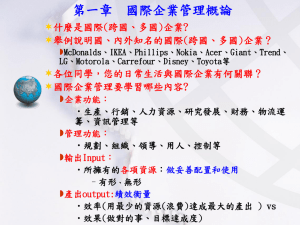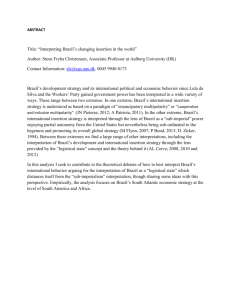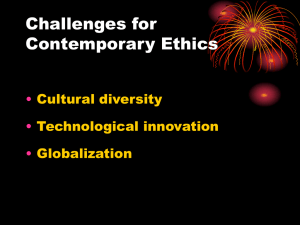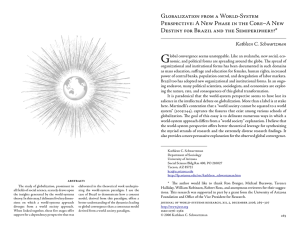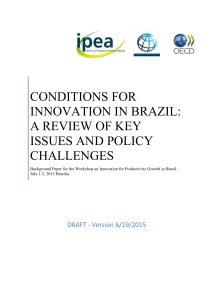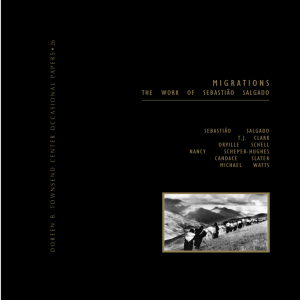Exam 1 Study Guide
advertisement
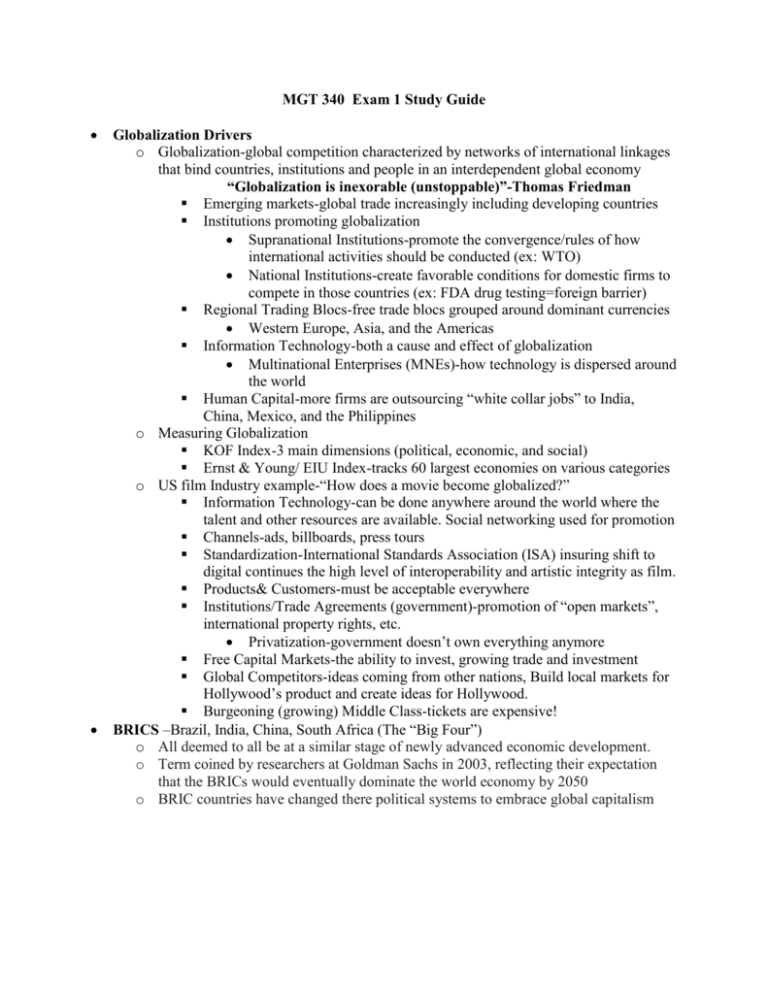
MGT 340 Exam 1 Study Guide Globalization Drivers o Globalization-global competition characterized by networks of international linkages that bind countries, institutions and people in an interdependent global economy “Globalization is inexorable (unstoppable)”-Thomas Friedman Emerging markets-global trade increasingly including developing countries Institutions promoting globalization Supranational Institutions-promote the convergence/rules of how international activities should be conducted (ex: WTO) National Institutions-create favorable conditions for domestic firms to compete in those countries (ex: FDA drug testing=foreign barrier) Regional Trading Blocs-free trade blocs grouped around dominant currencies Western Europe, Asia, and the Americas Information Technology-both a cause and effect of globalization Multinational Enterprises (MNEs)-how technology is dispersed around the world Human Capital-more firms are outsourcing “white collar jobs” to India, China, Mexico, and the Philippines o Measuring Globalization KOF Index-3 main dimensions (political, economic, and social) Ernst & Young/ EIU Index-tracks 60 largest economies on various categories o US film Industry example-“How does a movie become globalized?” Information Technology-can be done anywhere around the world where the talent and other resources are available. Social networking used for promotion Channels-ads, billboards, press tours Standardization-International Standards Association (ISA) insuring shift to digital continues the high level of interoperability and artistic integrity as film. Products& Customers-must be acceptable everywhere Institutions/Trade Agreements (government)-promotion of “open markets”, international property rights, etc. Privatization-government doesn’t own everything anymore Free Capital Markets-the ability to invest, growing trade and investment Global Competitors-ideas coming from other nations, Build local markets for Hollywood’s product and create ideas for Hollywood. Burgeoning (growing) Middle Class-tickets are expensive! BRICS –Brazil, India, China, South Africa (The “Big Four”) o All deemed to all be at a similar stage of newly advanced economic development. o Term coined by researchers at Goldman Sachs in 2003, reflecting their expectation that the BRICs would eventually dominate the world economy by 2050 o BRIC countries have changed there political systems to embrace global capitalism Environmental Analysis— o Political risk-any governmental action or politically motivated event that could adversely effect the long-run profitability or value of a form Nationalization/expropriation-the forced sale by the government of an Multinational Corporations assets to local buyers, with some compensation to the firm, perhaps leaving a minority ownership with the MNC Compliance Risk-government requirement that a MNE complies with the hometown laws (ex: Diversion) Terrorism-poses a severe and random risk to company personnel and assets and can interrupt the conduct of business o Macro VS Micro political risk events Macropolitical Risk Event-an event that affects all foreign firms doing business in a country/region (ex:terrorism) Micropolitical Risk Event-an event that affects one industry or company EX: Russia & IKEA-“Get them on your side” (them=provincial govt.) o Suppliers & Competitors-partner up with local business o Customers-good PR leads to support and public action Direct Defensive/Reactive • • • Linking/Merging • • • Indirect Consult authorities early & often Take legal action Control make-up of management (Hire well-connected locals into key company roles – vet carefully) • Lobby Russian government through official Swedish govt. channels (embassy) and through press. (Use press sparingly) Joint venture with Samara retailer or other powerful local entity Sign up powerful local tenants for mall – (mall doesn’t open on time, they lose revenue) Promote host goals – localize supply base, natural hedging (spending money where earning money) • Becoming good corporate citizen to host country and localities. (Support projects that do good things for the local people and promote IKEA’s unique offerings – furniture for schools, clinics, etc?) External Affairs/Public Relations important during start-up. Cultural o Self-reference criterion-the unconscious reference point of ones own cultural values Parochialism-when a person expects those from or in another culture to automatically fall into patterns of behavior common to his own Ethnocentrism-when one operates under the assumption that their ways fo doing something are the best Cultural Dimensions Hofstede-five value dimensions o Power Distance-level of acceptance of unequal distributions of power in institutions (low VS high) High Power Distance-Brazil & China, Low=US o Uncertainty Avoidance-the extent to which people in a society feel threatened by ambiguous situations (low VS high) High Uncertainty Avoidance=Brazil o Individualism VS Collectivism-the tendency of people to look after themselves and their immediate families only VS society as a whole Collectivist=Brazil & China, Individualism=US o Masculinity VS Femininity-degree of traditionally masculine values (exassertiveness, materialism, putting yourself first) in a society Femininity=Brazil, Masculinity=US & China o Time Orientation-striving toward long term goals vs. short term projects Long-Term Orientation=Brazil & China, Short-term=US Trompenaars Value Dimensions-28 countries o Universalism VS Particularism-apply rules/systems to society as a whole vs. taking consideration for individual circumstances o Neutral VS Affective-emotional orientation of relationships Affective=Brazil o Specific VS Diffuse (connected)-degree of separation between work and personal issues/life Diffuse-Brazil o Achievement VS Ascription-source of power and status in society (achievement: individual achievements=power, ascription: family=power) o Individualism VS Communitarianism-orientation with individuals VS orientation with a group/teams Individualism=US, Communitarianism=Brazil Chinese business culture o Guanxi-“connections”, network/relationships that entails the exchange of favors/gifts to provide an obligation to reciprocate o Human centered Management Style-put people before business o Confucionistic Management Style Five Relationships-4/5 are hierarchical, all in order=life in order Benevolence-treat others as you would want to be treated yourself Virtue-related to education, self-improvement, perseverance, moderation Ritual-expressing loyalty and reverence for others by following rites/codes Ethical issues o Ethics-decisions and interactions on an individual level o Moral Universalism-the need for a moral standard that is accepted by all cultures Ethnocentric Approach-company applies morality used in home nation Ethical Relativism-company adopts the local moral code where operating o International Code of Conduct-provides some consistent guidelines for MNEs o International business ethics-the business conduct or morals of MNCs in their relationships with individuals and entities EX: US=make moral judgments based on general rules o Caste system in India-ancient aspect of Hinduism, government has made it illegal to discriminated based on caste and must fill quotas of people from various castes Avoid situation VS deal with it Tata-affirmative action & Infosys-training programs Foreign Corrupt Practices Act (FCPA 1977)-prohibits US companies from making illegal payments, other gifts, or political contributions to foreign governments officials in order to influence them in business transactions. o Who it covers: Potentially applies to any individual, firm, officer, director, employee, or agent of a firm and any stockholder acting on behalf of a firm. Individuals and firms may also be penalized if they order, authorize, or assist someone else to violate the antibribery provisions or if they conspire to violate those provisions. Corrupt intent -- The person making or authorizing the payment must have a corrupt intent, and the payment must be intended to induce the recipient to misuse his official position to direct business wrongfully to the payer or to any other person. Payment -- The FCPA prohibits paying, offering, promising to pay (or authorizing to pay or offer) money or anything of value. Recipient -- The prohibition extends only to corrupt payments to a foreign official, a foreign political party or party official, or any candidate for foreign political office. Foreign Official-any officer or employee of a foreign government, public international organization, or any dept./agency thereof, or ppl acting in an official capacity. Business Purpose Test -- prohibits payments made in order to assist the firm in obtaining or retaining business for or with, or directing business to, any person. The DOJ interprets "obtaining or retaining business" broadly o Exceptions-Payments to Facilitate/Expedite Routine Governmental Action Issuing Documents and Permits & Processing Papers Providing Police Protection Mail Pick-up and Delivery Loading and Unloading Cargo o Two reasonable defenses “Lawful under the written laws and regulations of the foreign official's country.” “A reasonable and bona fide expenditure.”


